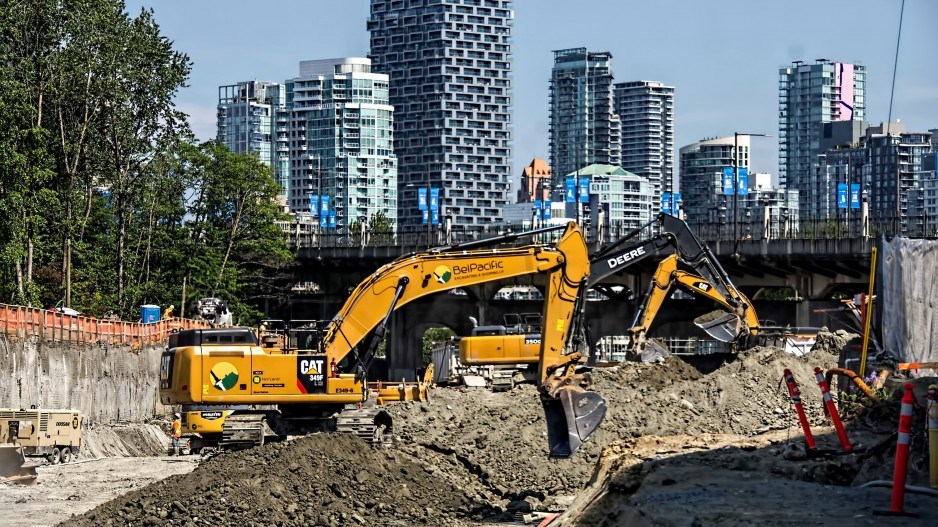Vancouver city hall is keeping citizens in the dark about how traffic to and from the Senakw towers will affect area streets, says the president of the Kits Point Residents Association (KPRA).
Eve Munro filed a freedom of information request in August 2022 for traffic impact studies about the federally approved, 11-tower project under construction beside the Burrard Bridge since last summer.
Almost a year later, Munro received 179 pages and all but six were censored in their entirety. The city invoked exceptions to the law for fear that disclosure would harm intergovernmental relations, and reveal Indigenous cultural heritage and traditional knowledge.
“The decision to withhold these traffic studies is consistent with the city's approach of keeping everything about the development secret and away from public scrutiny,” said Munro, who is planning an appeal to the Office of the Information and Privacy Commissioner. “It also seems to me that it's pretty much the antithesis of transparency and accountability in government.”
The only record provided was a May 2020 memo from City of Vancouver transportation and parking management engineer Lynn Morishita to a manager at Westbank Development, the Squamish Nation’s development partner, about “person trip generation.”
The memo references studies by consultant Bunt and Associates and mentions roadway connections to the site proposed from Chestnut Street north of Greer Avenue and an extension of Fir Street north of West First Avenue and Creekside Drive.
The towers, when fully built by 2030, are expected to be home for 10,000-12,000 people, but with fewer than 1,000 parking spots. That means demand for buses will skyrocket.
“The Senakw Lands are anticipated to generate 4,900 person trips during the AM peak hour. Transit trips could be between 1,200 and 1,700 during the peak hour, which equates to 10 to 14 additional articulated buses,” Morishita’s letter said.
“Existing routes which run close to the site are already very busy. All rank in the top 20 that generate the most passenger-hours of delay. Consideration is needed on how to support these prospective new transit trips by providing adequate service to the Senakw Lands.”
The letter cites TransLink's 2019 Bus Speed and Reliability Report, which pinpointed the four nearby transit corridors – Burrard Street, Granville Street, West 4th Avenue and Broadway – that rank in the top 20 for most passenger-hours of delay in the region. Some of the demand may ease with the 2026 opening of the Broadway Subway.
The memo emphasizes a key challenge for transportation planners, based on economic and transportation trends sparked by the pandemic: What about traffic from Uber, Evo, Amazon and Skip the Dishes vehicles to and from Senakw? It is the great unknown.
“Ride-hailing, taxis, and deliveries will also occur irrespective of the parking supply and may therefore be higher than would normally be expected for such a development in this location,” Morishita wrote.
“It's a very large development, it's beyond the question of density,” Munro said. “It's a very large number of people that will be accessing and egressing that parcel, and they're going to be doing it through residential streets. So we have a pretty keen interest in what that's going to look like for our community.”
Neither Morishita nor the Squamish Nation’s Nch’kay Development responded for comment.
KPRA is waiting for a СÀ¶ÊÓƵ Supreme Court judge to rule on its legal challenge to city hall’s 120-year deal to service the cluster of residential towers.
Kitsilano Point residents say the 2022 agreement signed with the Squamish Nation is one-sided and should be quashed because it was negotiated and passed in secret. The city maintains it acted properly under both the Indian Self-government Enabling Act and the Vancouver Charter.
KPRA’s concerns about lack of public consultation were also conveyed to the СÀ¶ÊÓƵ Utilities Commission via the Residential Consumer Intervener Association. The regulator is conducting a written inquiry into the application to build a district energy plant for the towers.
Westbank is also the parent of Creative Energy, whose Creative Energy Senakw LP (CESLP) filed the application last year for a certificate of public convenience and necessity to heat and cool the seven buildings in the first two phases. Phase one of the towers is expected to be complete in 2025.
When he appeared for a groundbreaking ceremony at the Squamish Nation reserve on Sept. 6, 2022, Prime Minister Justin Trudeau announced a $1.4-billion loan through Canada Mortgage and Housing Corp. to finance half the units in Senakw’s first two phases.
A 2019 expert report for Squamish Nation members estimated the project could bring as much as $12.7 billion cashflow for the band and developer.
twitter.com/bobmackin





